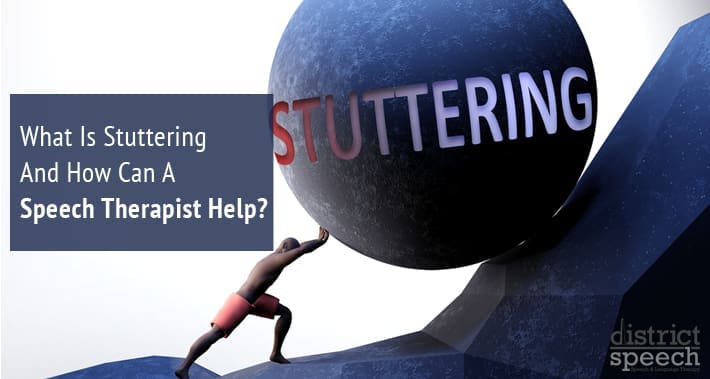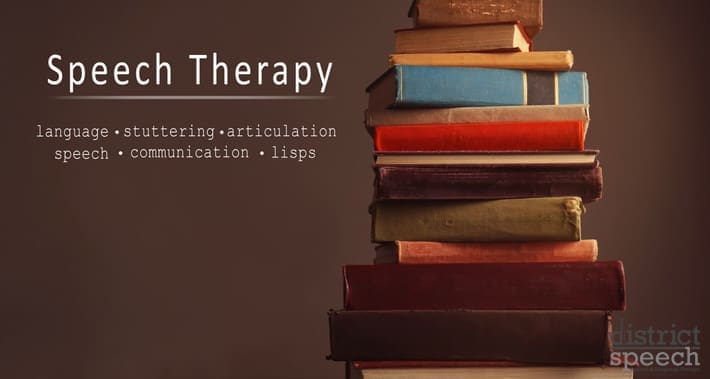
Stuttering is a disorder that can affect both children and adults.
If you or your child stutters, you probably know that it can cause anxiety in social situations.
Like many speech disorders, there are many different causes of stuttering.
There are also quite a few different types of stuttering.
In this article, we’ll talk about each type of stuttering and how a speech therapist can help.
The good news is that nearly all types of stuttering can be improved.
Your speech therapist will be able to target therapeutic exercises toward your particular type of stutter.
If you’re looking for speech therapy treatments for stuttering contact District Speech to speak with one of our many experienced Washington DC speech therapists.
Now, let’s dive in.
What Is Stuttering?
Stuttering is a fluency disorder.
It is also known as stammering or disfluent speech.
It is a speech disorder with a few different characteristics including:
- Repeated words
- Repeated sounds
- Repeated syllables
- Halting speech
- Uneven speech rate
Stuttering is more common in childhood.
It is estimated that stuttering affects 5-10% of all children between the ages of 2 and 6.
Most children, however, don’t continue to stutter in adulthood.
It usually stops as your child develops.
Early intervention speech therapy is especially helpful as a preventative measure if you notice that your child stutters.
It can help their stutter improve faster and reduce the likelihood of any difficulties in adulthood.
RELATED: Dispelling The Myths Around Speech Therapy For Kids
What Are The Symptoms Of Stuttering?
We’ve mentioned already that some common symptoms of stuttering include repeated words, sounds, syllables, and disruptions in your normal rate of speech.
For example, if you stutter, you may find yourself repeating consonants like ‘K’ or ‘T’.
You may also notice that you have challenges articulating certain sounds.
You might also notice these issues often occur at the start of a sentence.
RELATED: Frequently Asked Questions About Stuttering
Stuttering can be very stressful.
The stress and anxiety associated with stuttering can sometimes cause other physical and mental challenges, like:
- Frustration when trying to communicate
- Refusing to speak
- Frequent interjections of extra sounds or words like ‘um’ or ‘uh’
- Excessive blinking and visible tension in the face or upper body
- Physical changes like facial tics or lip tremors
- Rearranging words in a sentence
- Noticeable vocal tension
Because stuttering is associated with stress, you may find that your child stutters more frequently in high stress environments.
However, your child may not even be aware that they stutter at all.
If you or your child stutters, you may notice increased difficulty with participating in public speaking.
Many people who stutter find public speaking especially stressful and challenging.
Are There Different Types Of Stuttering?
There are three different types of stuttering.
Each type has a different cause and sometimes different symptoms.
The three types are neurogenic stuttering, developmental stuttering, and psychogenic stuttering.
Let’s take a closer look.
1. Neurogenic Stuttering
Neurogenic stuttering often occurs due to brain injury, like a traumatic brain injury or stroke.
When your brain becomes injured, it can affect the signals that are sent to you body.
Since your brain controls speech, this can also affect your ability to speak clearly.
In the case of neurogenic stuttering, there is a disconnect between the signals your brain sends to your mouth and the muscles that control your speech.
This means that while your brain “knows” how to speak without stuttering, it can’t effectively communicate that to your mouth anymore.
When this happens, your muscles fail to generate speech properly, which causes a stutter.
The good news is that often these issues can be fully or partially treated.
Usually, it just takes practice as your brain relearns how to send the signals through different pathways.
2. Developmental Stuttering
Developmental stuttering is the kind of stuttering that typically occurs in children.
It usually manifests itself in children under 5.
This age is when most children first begin to develop their spoken language abilities.
Developmental stuttering can resolve on its own without treatment.
However, it can be a good idea to seek out a speech therapist if your child does have a developmental stutter.
Working with a speech therapist will help the stutter resolve on its own more quickly.
It can also reduce any anxiety or stress your child may experience as a result of their stutter.
3. Psychogenic Stuttering
Psychogenic stuttering originates in the part of the brain that is responsible for your thinking and reasoning.
Usually, it’s triggered by severe emotional distress or trauma.

What Causes Stuttering?
We’ve addressed some of the causes of different types of stuttering already.
However, there are also some more general possible causes of stuttering that can include:
- A family history of stuttering
- Family dynamics
- Neurophysiology
- Development during childhood
Stuttering can run in a family because of an inherited abnormality in the part of the brain that is responsible for language.
In this case, it’s just straight genetics that pass it along.
Studies have also shown that stuttering is linked to ADHD.
How Can A Speech Therapist Help With Stuttering?
Speech therapists can be a big help when it comes to stuttering in childhood.
They do this through speech therapy for kids which can improve your child’s self esteem and reduce interruptions during speech.
Typically, speech therapy focuses on controlling speech patterns.
Your child can control their speech patterns by learning to focus on their breath support, laryngeal tension, and rate of speech.
Speech therapists can also teach parents how to use therapeutic techniques at home.
Sometimes these will be speech specific exercises.
Other times, these will be exercises formulated to help support your child as they stutter and raise their self esteem as they work to overcome their stutter.
Some quick examples of this include listening patiently and setting aside the time to practice speaking with your child.
This helps your child’s mental health improve as they overcome their stutter.
A speech therapist can also teach you when and how it’s appropriate to correct your child’s stuttering.
Sometimes it’s important to correct your child’s stutter, but other times this can harm more than it helps because it may increase anxiety or decrease self esteem.
You or your child might be an ideal candidate for stuttering speech therapy if:
- Your child has stuttered for three to six months
- Your child has pronounced stuttering
- Your child experiences emotional difficulties because of their stuttering
- You have a family history of stuttering
Adult speech therapy can look similar to speech therapy for children.
However, it often takes longer to improve your stutter as an adult.
This is because you’ve had much more time to develop bad habits around your speech.
Regardless, though, a speech therapist can still help you reduce your stutter so you can communicate more clearly.
Book Your Appointment With District Speech Today
If you or your child fall into any of these categories and you’re looking for speech therapy treatments for stuttering contact District Speech today.
We can schedule an evaluation for you or your child to help us understand the best way to help your stutter.
Remember, the earlier you or your child are able to start speech therapy, the greater the chances for success.
Book your appointment with District Speech today.
1300 I St NW, Suite 400 E,
Washington, DC 20005
- https://g.page/districtspeech
District Speech and Language Therapy specializes in speech therapy, physical therapy, and occupational therapy solutions, for both children and adults, in the Washington D.C and the Arlington Virginia areas.